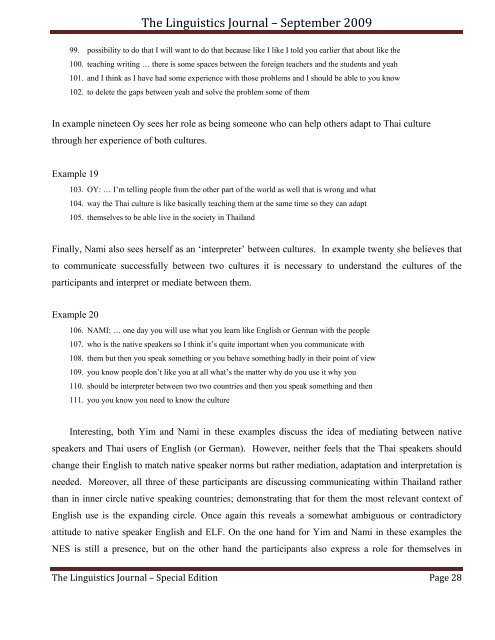The Linguistics Journal September 2009 Special Edition Language
The Linguistics Journal September 2009 Special Edition Language
The Linguistics Journal September 2009 Special Edition Language
You also want an ePaper? Increase the reach of your titles
YUMPU automatically turns print PDFs into web optimized ePapers that Google loves.
<strong>The</strong> <strong>Linguistics</strong> <strong>Journal</strong> – <strong>September</strong> <strong>2009</strong><br />
99. possibility to do that I will want to do that because like I like I told you earlier that about like the<br />
100. teaching writing … there is some spaces between the foreign teachers and the students and yeah<br />
101. and I think as I have had some experience with those problems and I should be able to you know<br />
102. to delete the gaps between yeah and solve the problem some of them<br />
In example nineteen Oy sees her role as being someone who can help others adapt to Thai culture<br />
through her experience of both cultures.<br />
Example 19<br />
103. OY: … I’m telling people from the other part of the world as well that is wrong and what<br />
104. way the Thai culture is like basically teaching them at the same time so they can adapt<br />
105. themselves to be able live in the society in Thailand<br />
Finally, Nami also sees herself as an ‘interpreter’ between cultures. In example twenty she believes that<br />
to communicate successfully between two cultures it is necessary to understand the cultures of the<br />
participants and interpret or mediate between them.<br />
Example 20<br />
106. NAMI: … one day you will use what you learn like English or German with the people<br />
107. who is the native speakers so I think it’s quite important when you communicate with<br />
108. them but then you speak something or you behave something badly in their point of view<br />
109. you know people don’t like you at all what’s the matter why do you use it why you<br />
110. should be interpreter between two two countries and then you speak something and then<br />
111. you you know you need to know the culture<br />
Interesting, both Yim and Nami in these examples discuss the idea of mediating between native<br />
speakers and Thai users of English (or German). However, neither feels that the Thai speakers should<br />
change their English to match native speaker norms but rather mediation, adaptation and interpretation is<br />
needed. Moreover, all three of these participants are discussing communicating within Thailand rather<br />
than in inner circle native speaking countries; demonstrating that for them the most relevant context of<br />
English use is the expanding circle. Once again this reveals a somewhat ambiguous or contradictory<br />
attitude to native speaker English and ELF. On the one hand for Yim and Nami in these examples the<br />
NES is still a presence, but on the other hand the participants also express a role for themselves in<br />
<strong>The</strong> <strong>Linguistics</strong> <strong>Journal</strong> – <strong>Special</strong> <strong>Edition</strong> Page 28


